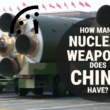To abolish nuclear weapons, strip away their handsome mask
By Mustafa Kibaroglu, December 19, 2016
The golden age of deterrence has reached its end. Nuclear weapons, once a star player on the international stage, no longer enjoy a place in the limelight.
To be sure, some policy makers still ascribe to nuclear weapons the same prestige that, during the Cold War, they gained because of their unmatched destructive power and the leverage they provided nuclear weapon states in the international arena. But the Cold War environment, in which nuclear weapons in the hands of two superpowers played a vital role in maintaining strategic stability, doesn’t exist anymore. Nor is it likely to be replicated in the future—despite certain parallels between US-Soviet relations during the Cold War and present-day US-Russia relations. Meanwhile, it is painfully obvious that nuclear deterrence is useless against apocalyptic terrorist organizations motivated by religious extremism. If such a group acquired and used a nuclear weapon, there would be no “return address” toward which retaliation could be directed. And apocalyptic terrorists probably don’t fear destruction in the first place.
Now that the golden age of deterrence has reached its end, banning nuclear weapons has become achievable—as long as the values that policy makers ascribe to them can be undermined. Now is the time to strip away the handsome mask that hid nuclear weapons’ ugly face throughout the Cold War. It’s time for the world to treat nuclear weapons just like chemical and biological weapons—those other weapons of mass destruction—as mere slaughtering weapons, undeserving of prestige. It is time to ban nuclear weapons—just as biological and chemical weapons were banned through the Biological and Toxin Weapons Convention and the Chemical Weapons Convention.
Why now. Throughout history, weapons have been invented for various reasons, but mainly to kill the enemy. If a weapon exists, sooner or later it will be used—especially if factors that might diminish the probability of its use, such as peace treaties, stable political environments, rational leadership, and deterrence capabilities—have weakened or disappeared.
In today’s world and in the foreseeable future, can we count on rational political leadership to maintain a stable international environment in which nuclear weapons will not be used? It is difficult to answer “yes.” The only reliable way to prevent nuclear catastrophe is to ban production of these weapons and eliminate them for good. Indeed, given the increasing ability of many states and non-state actors to master the scientific knowledge and technological skills necessary to build nuclear explosive devices, whether crude or sophisticated, the world will become dramatically less safe if nuclear weapons aren’t eliminated soon. The existing disarmament and nonproliferation structure hasn’t achieved disarmament yet and seems unlikely to do so in the foreseeable future. Thus the ban treaty.
What to include. The question then becomes what a ban treaty should entail. First and foremost, it should ensure that states adhering to it enjoy the same rights to peaceful uses of nuclear energy as are currently enjoyed by non-nuclear weapon states under the Nuclear Non-Proliferation Treaty (NPT). That is, the basic bargain that attracted many states to the NPT—foregoing the option to build nuclear weapons in exchange for assistance in the peaceful applications of nuclear energy—should be enshrined in the new treaty. The International Atomic Energy Agency (IAEA) should continue its responsibility for assisting states in their nuclear power undertakings.
Second, the ban treaty should establish an effective verification mechanism—but probably not the IAEA as currently constituted. Given that the nuclear weapon states will one day have to join the ban treaty if it’s to be successful, the treaty’s verification mechanisms can’t be dominated by nuclear weapon states, as the agency is dominated today. The Organisation for the Prohibition of Chemical Weapons (OPCW) might represent a more useful template. The OPCW has thus far carried out its work toward eliminating chemical weapons in a fair, timely, and effective way.
Third, a ban treaty will transform the entire world into a nuclear-weapon-free zone once it becomes universal. Existing zones’ provisions should therefore be a source of inspiration to the treaty’s drafters, especially in terms of rights and responsibilities.
Reasons for optimism. A ban treaty’s chances of achieving disarmament would be no worse than the NPT’s chances—maybe better. One factor in the ban treaty’s favor is that no country can perceive a legitimate threat from it. The non-nuclear weapon states today don’t perceive any threat from the NPT—and if the ban treaty is ever universalized, every state will be a non-nuclear weapon state. No nation will be capable of bullying its neighbors with threats of using nuclear weapons.
Another helpful factor is that the ban treaty movement can build on the existing disarmament regime, in which all but four countries—Israel, India, Pakistan, and North Korea—already participate. Of those four, India and Pakistan abstained in the October voting on the ban treaty. Their abstentions must be considered positive signs for a ban treaty’s prospects for achieving total disarmament. China, meanwhile, abstained as well. This can be read as a statement that Beijing is unafraid of a world without nuclear weapons even though it has the privilege of official nuclear weapon status.
Another interesting abstention is that of the Netherlands, a member of NATO—every other member of which voted against the resolution. The Netherlands is also one of five European countries that, as part of NATO’s nuclear burden-sharing agreement, host tactical nuclear weapons belonging to the United States. Perhaps the Netherlands’ abstention represents a chink in the armor that the United States and several other nuclear-armed countries have established to protect their nuclear weapons from the ban treaty initiative.
Would a ban treaty be sufficient to eliminate nuclear weapons? Well, given that the treaty initiative is not embraced by the nations that possess most of the global nuclear inventory, one could argue that it will prove to be an unsuccessful endeavor. But this would be a shortsighted take. The ban may not end the reign of nuclear weapons on its own, nor do so in the foreseeable future, but it can be expected to create a universal stigma around nuclear weapons—signifying the beginning of the end. It would not be a surprise if, decades from now, the ban treaty is regarded as the foundation of a world free of nuclear weapons.
Topics: Nuclear Weapons
Share: [addthis tool="addthis_inline_share_toolbox"]














